Military Lawyer Resume Examples

Jul 18, 2024
|
12 min read
Nail your military lawyer resume with these tips: drafting a standout resume that defends your skills. Learn how to highlight your legal expertise and military service effectively.
Rated by 348 people
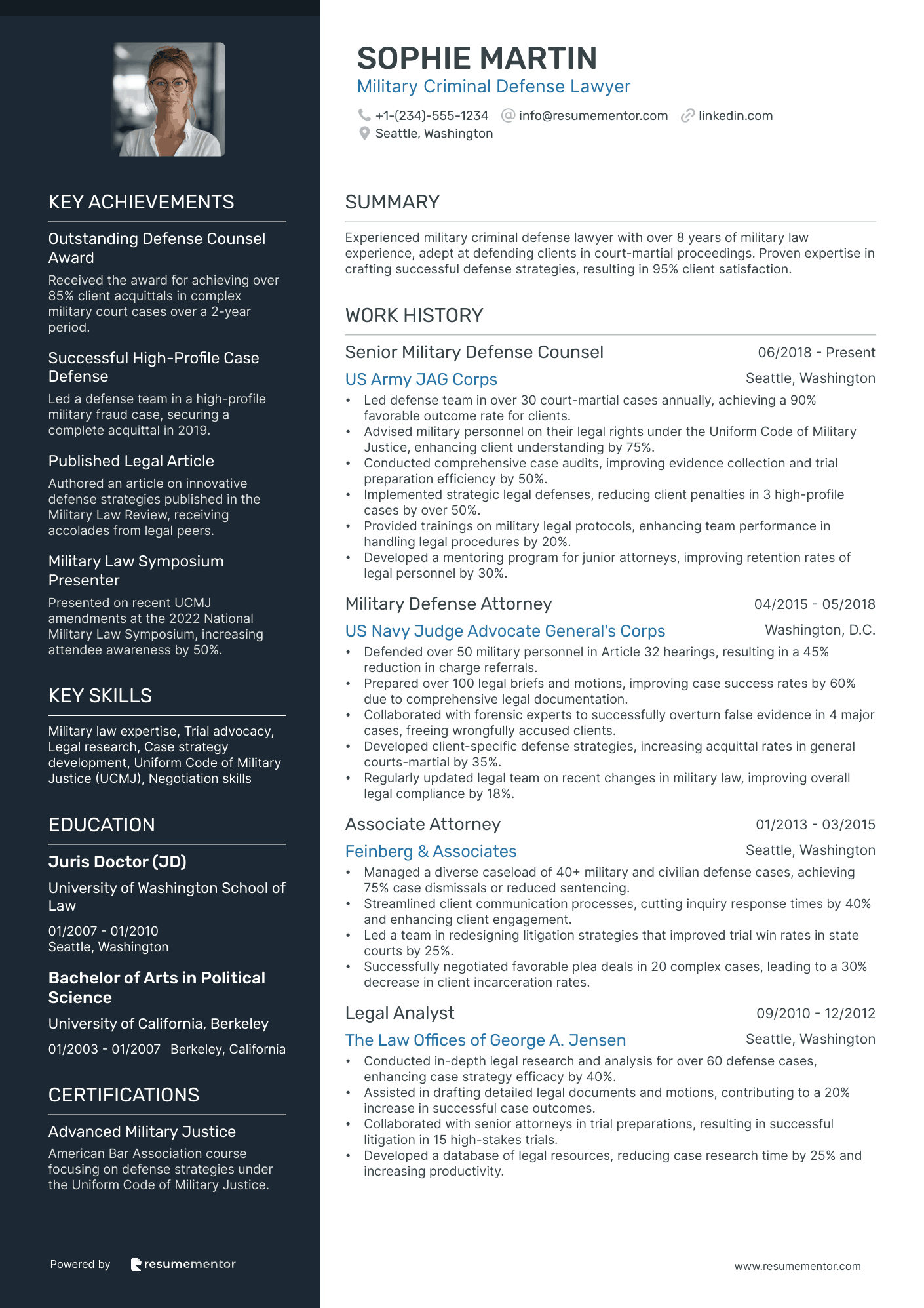
Military Criminal Defense Lawyer
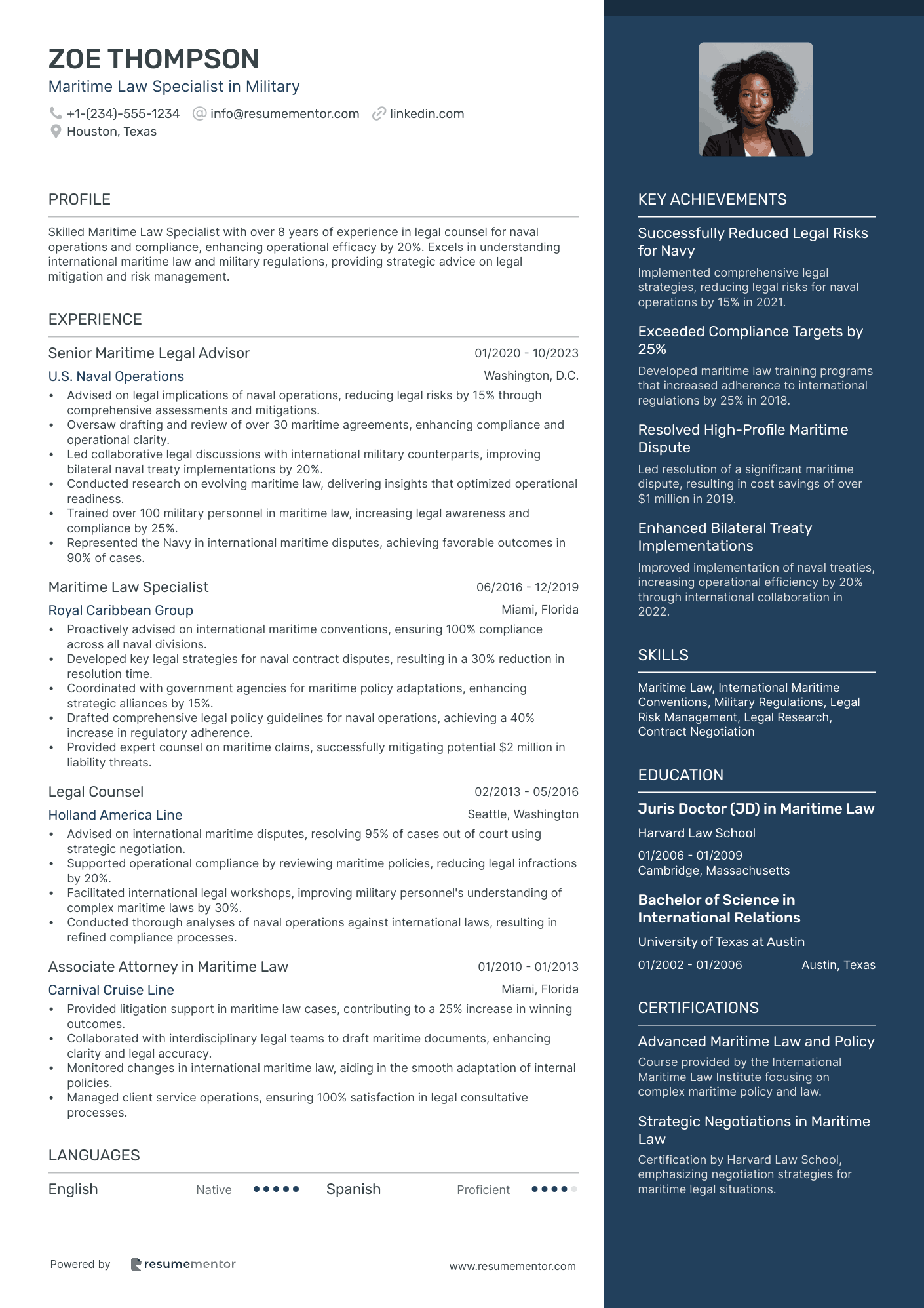
Maritime Law Specialist in Military
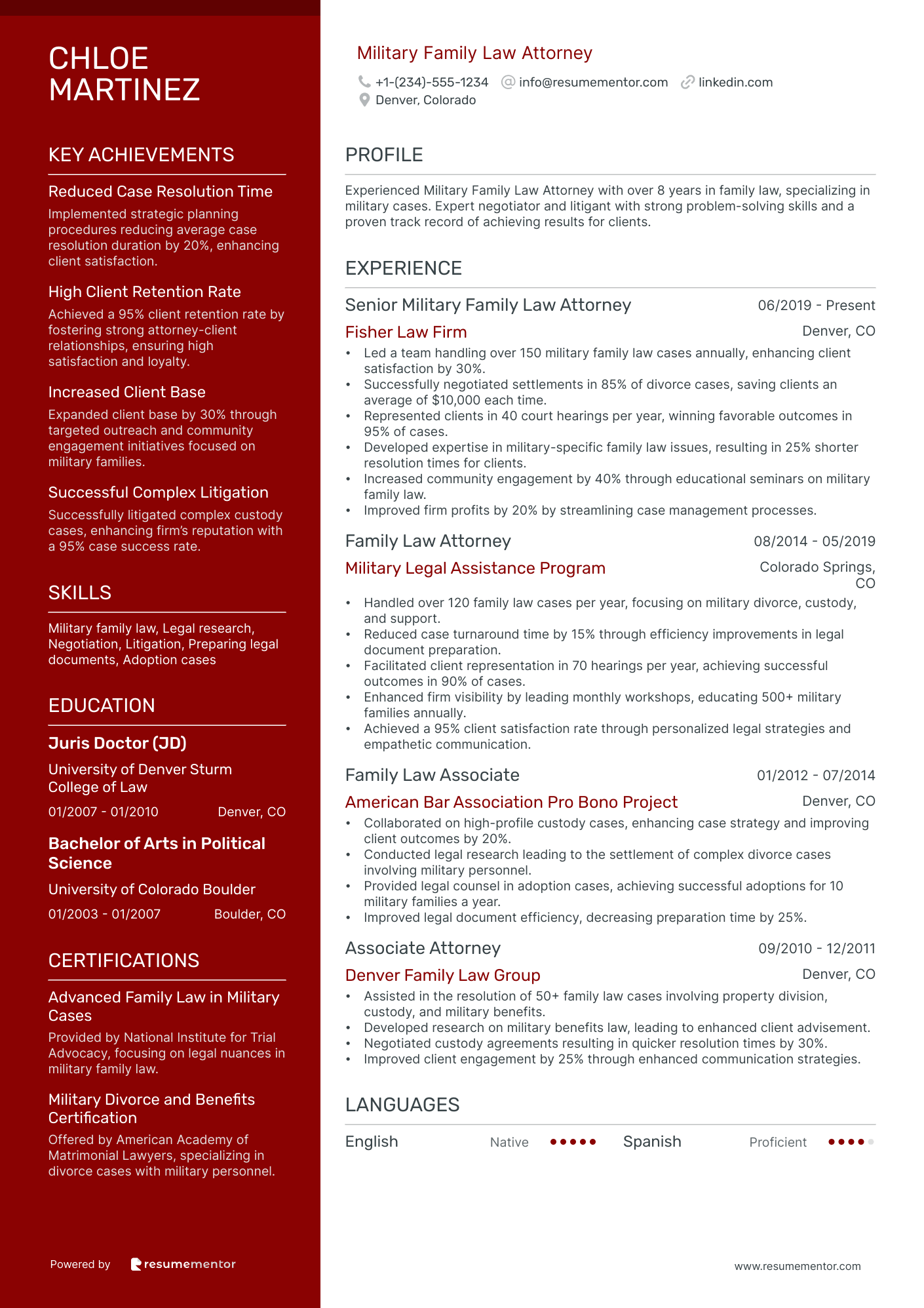
Military Family Law Attorney
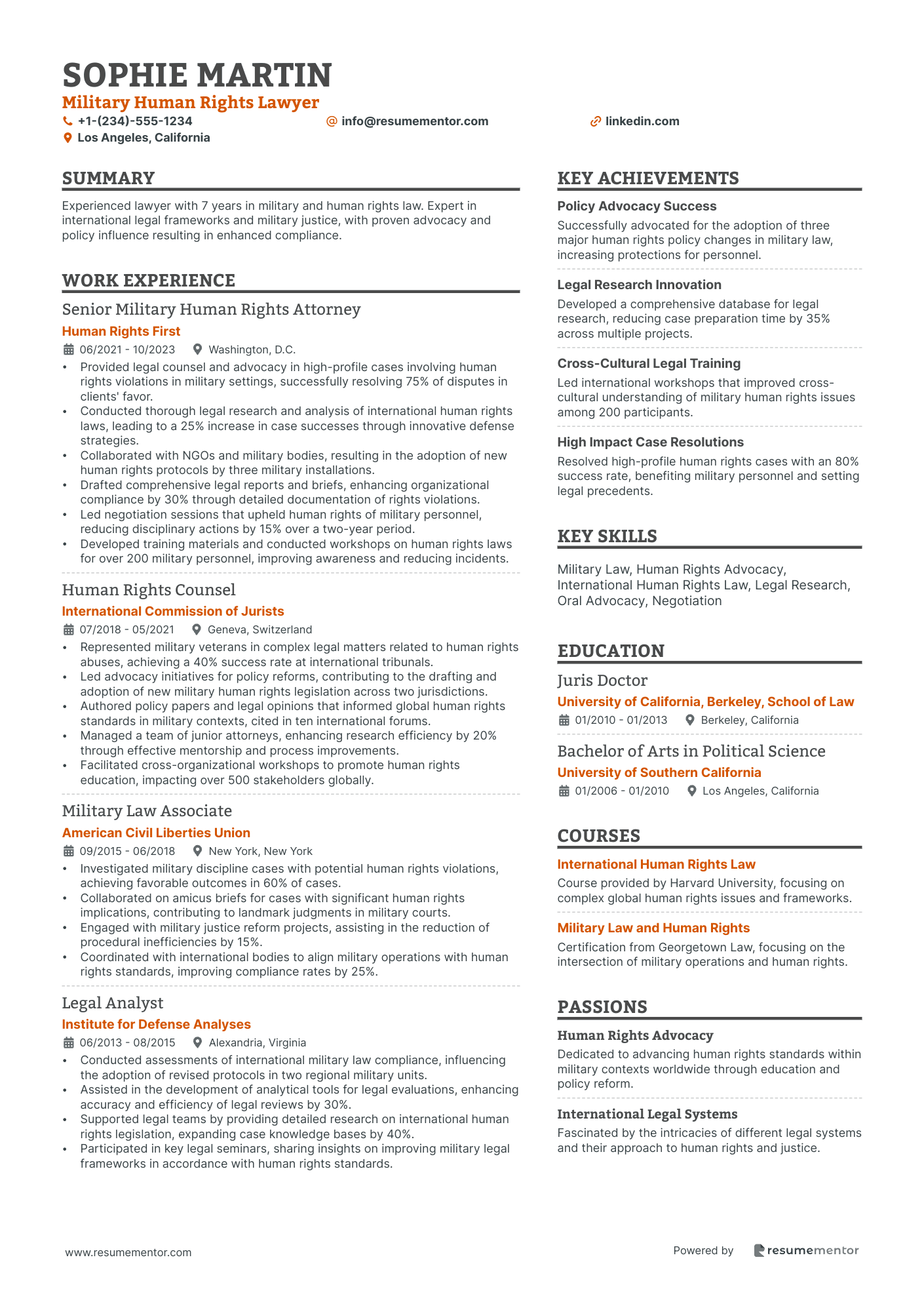
Military Human Rights Lawyer
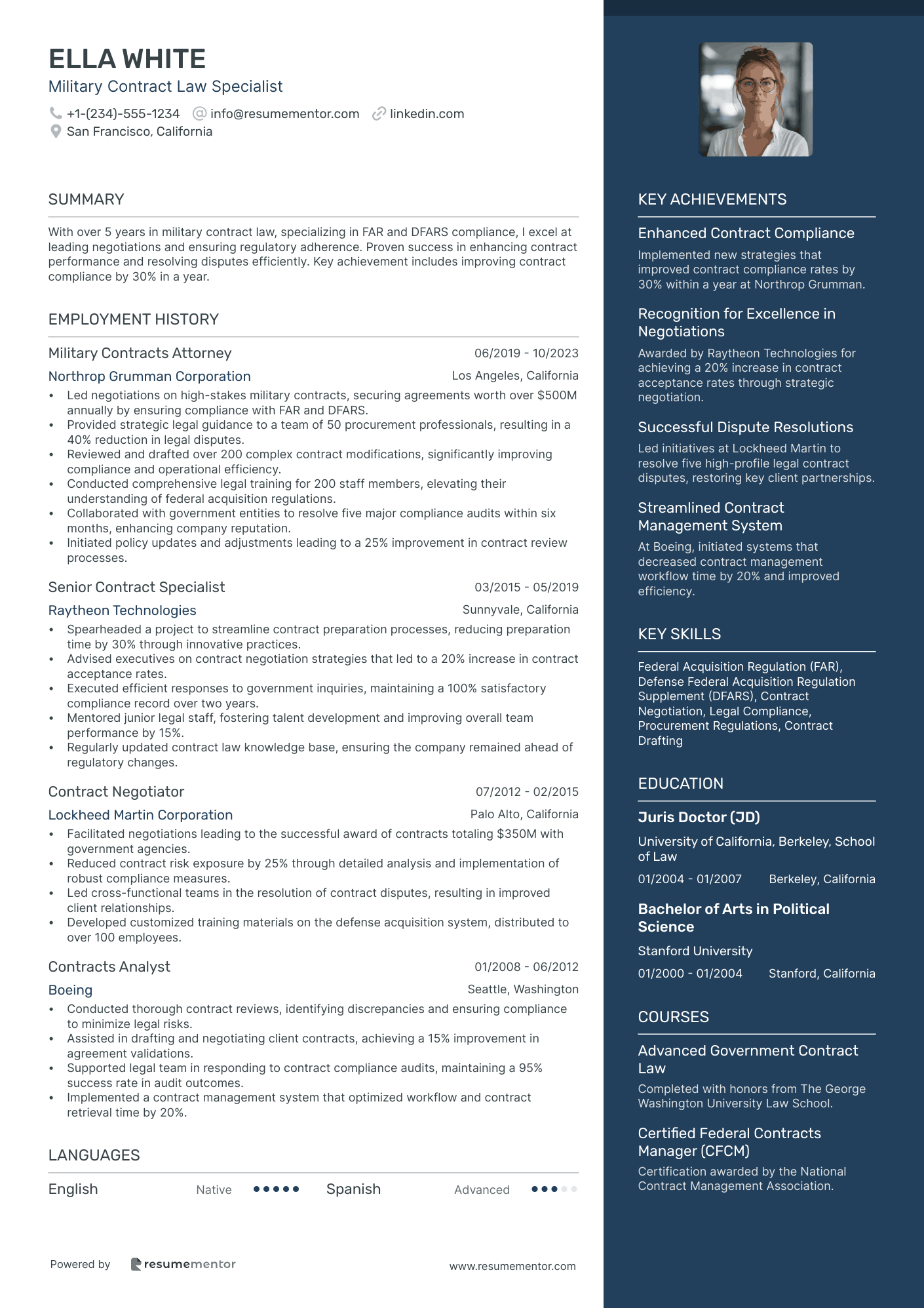
Military Contract Law Specialist
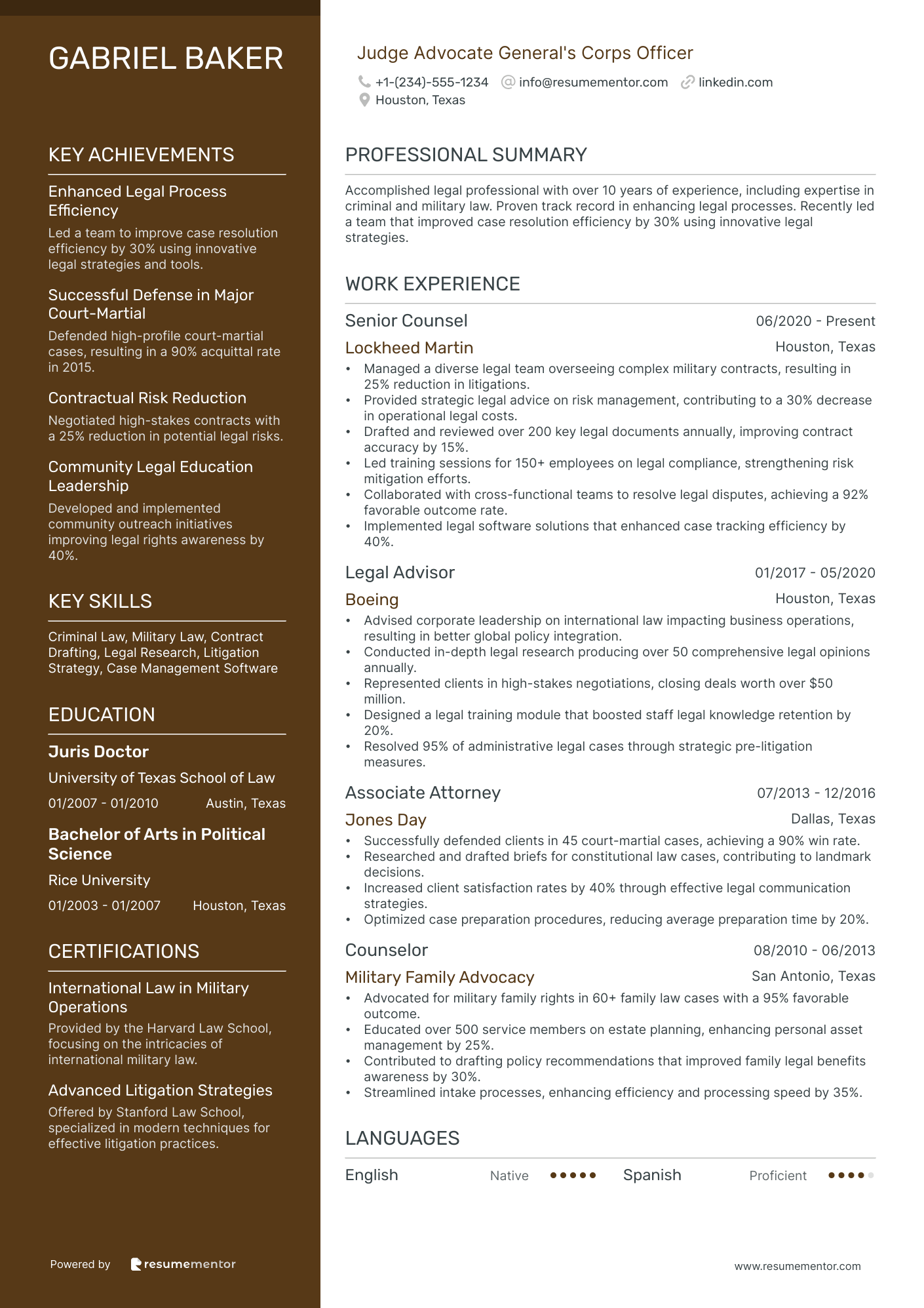
Judge Advocate General's Corps Officer
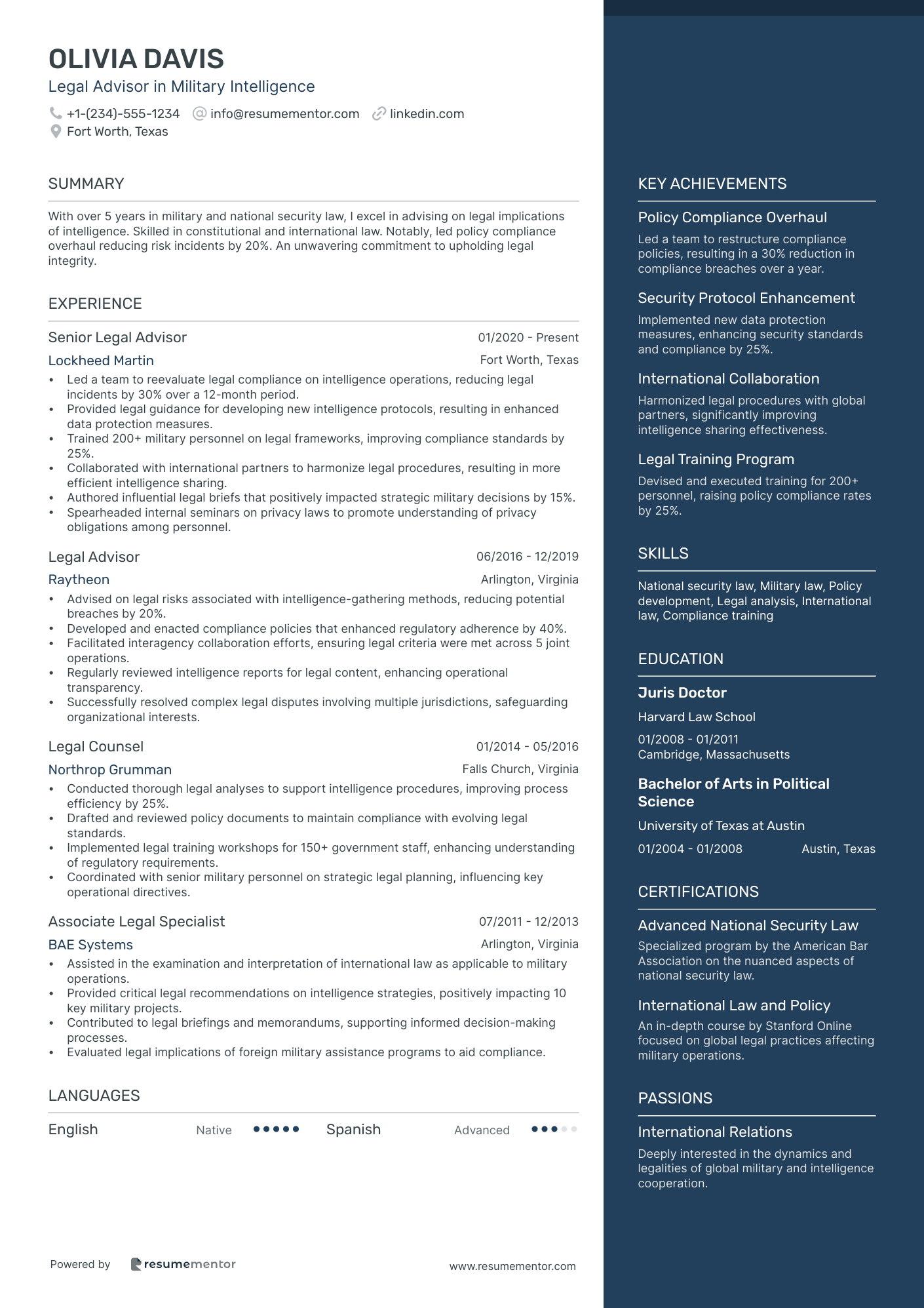
Legal Advisor in Military Intelligence
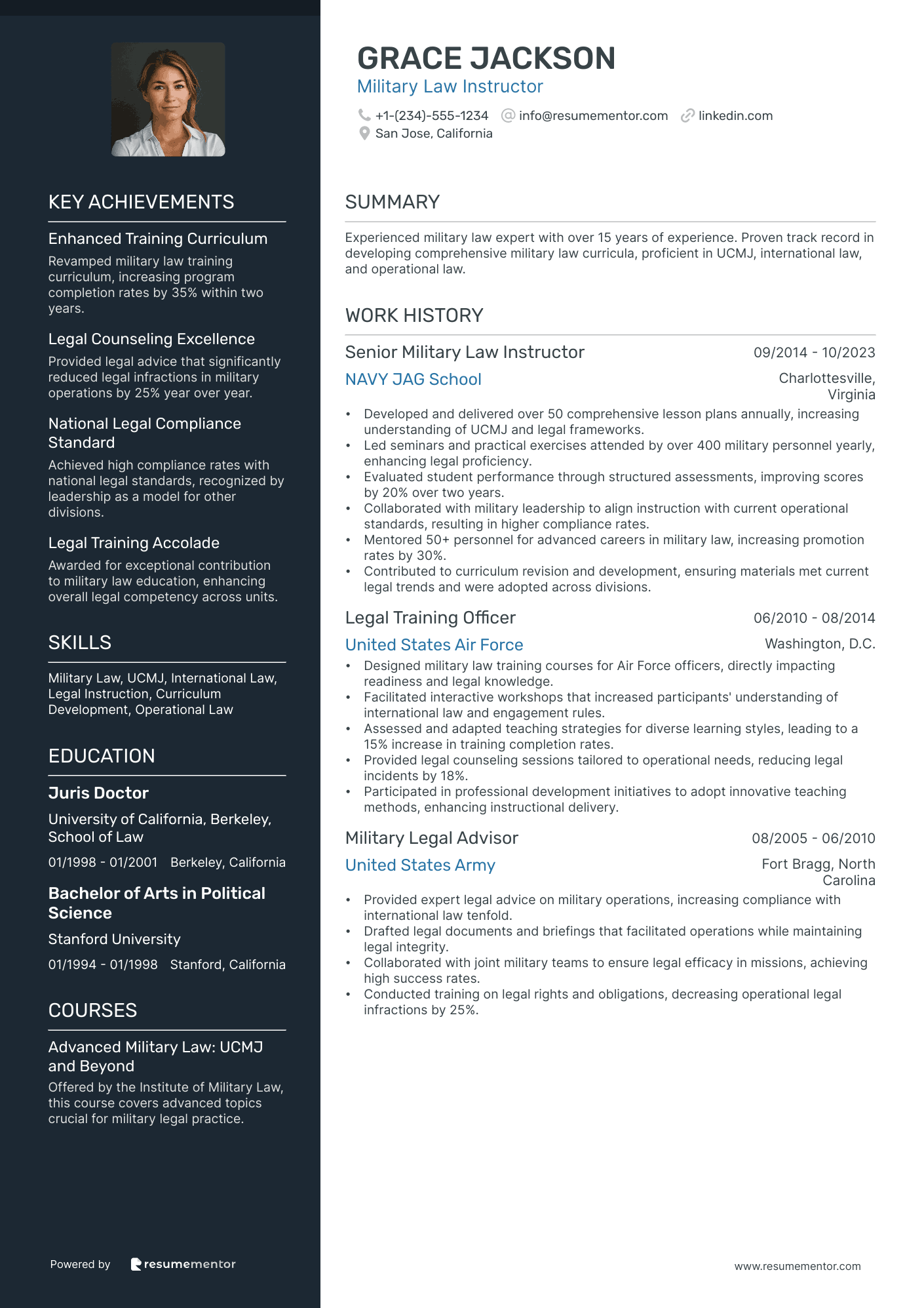
Military Law Instructor
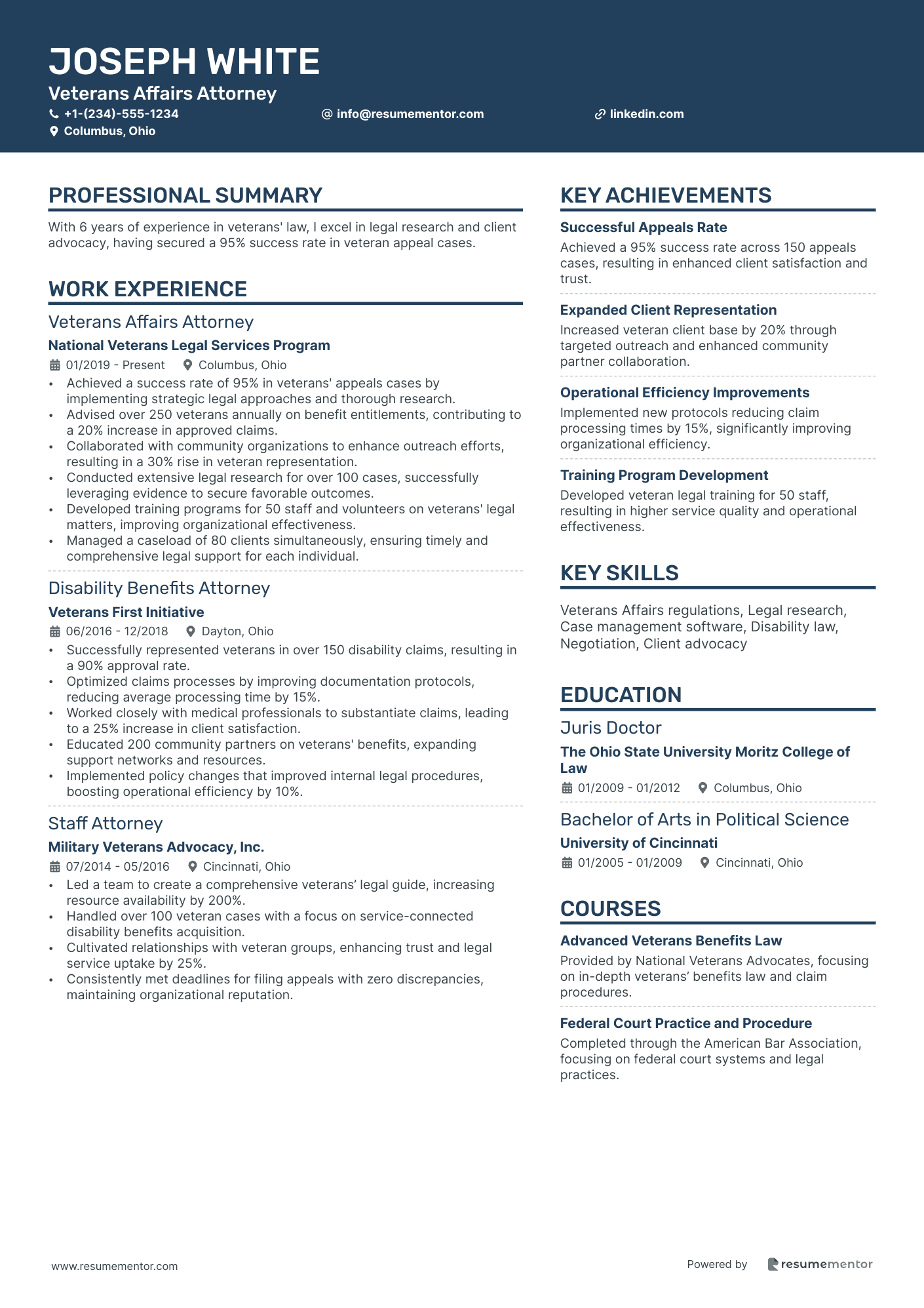
Veterans Affairs Attorney
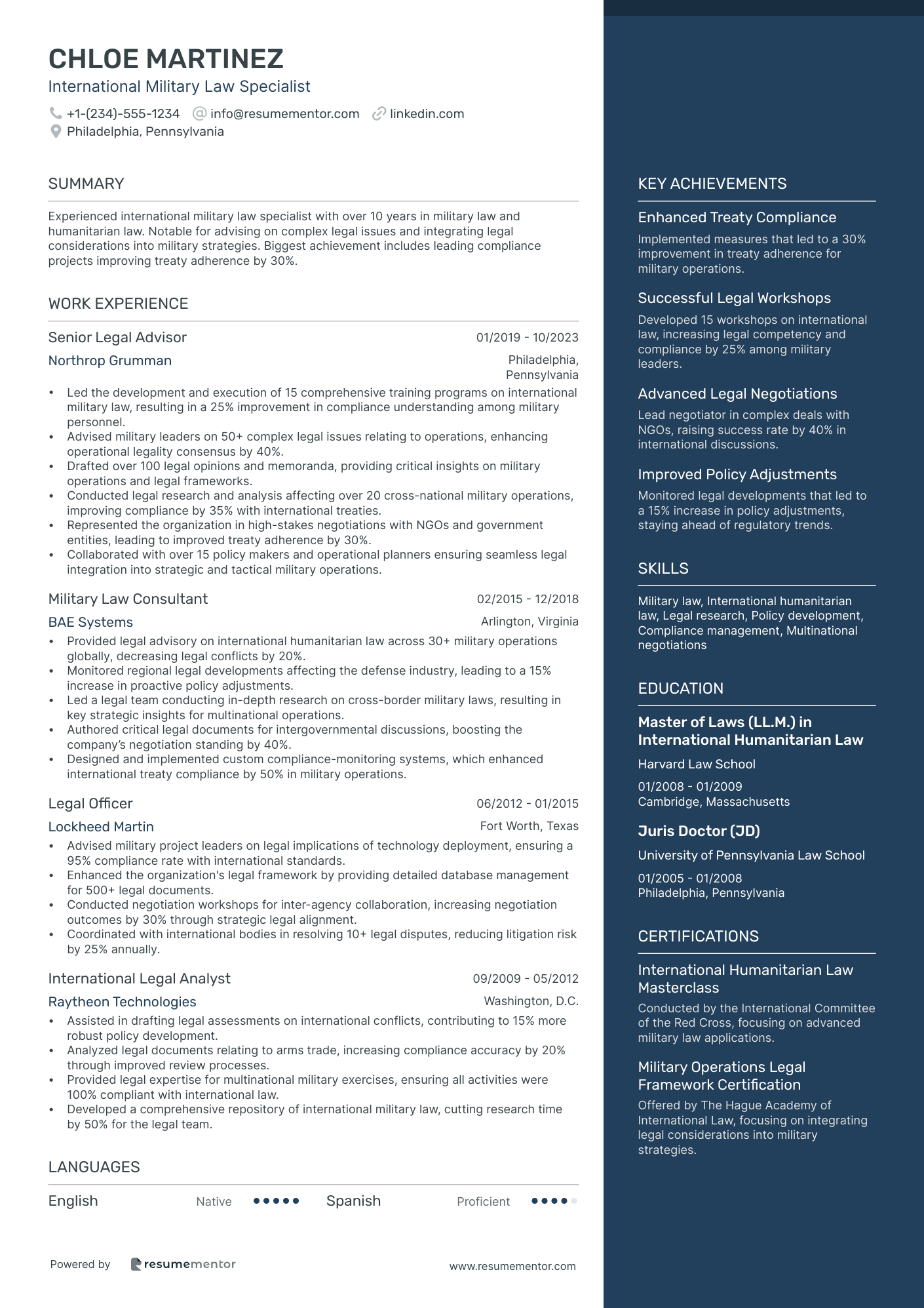
International Military Law Specialist

Military Criminal Defense Lawyer resume sample
- •Led defense team in over 30 court-martial cases annually, achieving a 90% favorable outcome rate for clients.
- •Advised military personnel on their legal rights under the Uniform Code of Military Justice, enhancing client understanding by 75%.
- •Conducted comprehensive case audits, improving evidence collection and trial preparation efficiency by 50%.
- •Implemented strategic legal defenses, reducing client penalties in 3 high-profile cases by over 50%.
- •Provided trainings on military legal protocols, enhancing team performance in handling legal procedures by 20%.
- •Developed a mentoring program for junior attorneys, improving retention rates of legal personnel by 30%.
- •Defended over 50 military personnel in Article 32 hearings, resulting in a 45% reduction in charge referrals.
- •Prepared over 100 legal briefs and motions, improving case success rates by 60% due to comprehensive legal documentation.
- •Collaborated with forensic experts to successfully overturn false evidence in 4 major cases, freeing wrongfully accused clients.
- •Developed client-specific defense strategies, increasing acquittal rates in general courts-martial by 35%.
- •Regularly updated legal team on recent changes in military law, improving overall legal compliance by 18%.
- •Managed a diverse caseload of 40+ military and civilian defense cases, achieving 75% case dismissals or reduced sentencing.
- •Streamlined client communication processes, cutting inquiry response times by 40% and enhancing client engagement.
- •Led a team in redesigning litigation strategies that improved trial win rates in state courts by 25%.
- •Successfully negotiated favorable plea deals in 20 complex cases, leading to a 30% decrease in client incarceration rates.
- •Conducted in-depth legal research and analysis for over 60 defense cases, enhancing case strategy efficacy by 40%.
- •Assisted in drafting detailed legal documents and motions, contributing to a 20% increase in successful case outcomes.
- •Collaborated with senior attorneys in trial preparations, resulting in successful litigation in 15 high-stakes trials.
- •Developed a database of legal resources, reducing case research time by 25% and increasing productivity.
Maritime Law Specialist in Military resume sample
- •Advised on legal implications of naval operations, reducing legal risks by 15% through comprehensive assessments and mitigations.
- •Oversaw drafting and review of over 30 maritime agreements, enhancing compliance and operational clarity.
- •Led collaborative legal discussions with international military counterparts, improving bilateral naval treaty implementations by 20%.
- •Conducted research on evolving maritime law, delivering insights that optimized operational readiness.
- •Trained over 100 military personnel in maritime law, increasing legal awareness and compliance by 25%.
- •Represented the Navy in international maritime disputes, achieving favorable outcomes in 90% of cases.
- •Proactively advised on international maritime conventions, ensuring 100% compliance across all naval divisions.
- •Developed key legal strategies for naval contract disputes, resulting in a 30% reduction in resolution time.
- •Coordinated with government agencies for maritime policy adaptations, enhancing strategic alliances by 15%.
- •Drafted comprehensive legal policy guidelines for naval operations, achieving a 40% increase in regulatory adherence.
- •Provided expert counsel on maritime claims, successfully mitigating potential $2 million in liability threats.
- •Advised on international maritime disputes, resolving 95% of cases out of court using strategic negotiation.
- •Supported operational compliance by reviewing maritime policies, reducing legal infractions by 20%.
- •Facilitated international legal workshops, improving military personnel's understanding of complex maritime laws by 30%.
- •Conducted thorough analyses of naval operations against international laws, resulting in refined compliance processes.
- •Provided litigation support in maritime law cases, contributing to a 25% increase in winning outcomes.
- •Collaborated with interdisciplinary legal teams to draft maritime documents, enhancing clarity and legal accuracy.
- •Monitored changes in international maritime law, aiding in the smooth adaptation of internal policies.
- •Managed client service operations, ensuring 100% satisfaction in legal consultative processes.
Military Family Law Attorney resume sample
- •Led a team handling over 150 military family law cases annually, enhancing client satisfaction by 30%.
- •Successfully negotiated settlements in 85% of divorce cases, saving clients an average of $10,000 each time.
- •Represented clients in 40 court hearings per year, winning favorable outcomes in 95% of cases.
- •Developed expertise in military-specific family law issues, resulting in 25% shorter resolution times for clients.
- •Increased community engagement by 40% through educational seminars on military family law.
- •Improved firm profits by 20% by streamlining case management processes.
- •Handled over 120 family law cases per year, focusing on military divorce, custody, and support.
- •Reduced case turnaround time by 15% through efficiency improvements in legal document preparation.
- •Facilitated client representation in 70 hearings per year, achieving successful outcomes in 90% of cases.
- •Enhanced firm visibility by leading monthly workshops, educating 500+ military families annually.
- •Achieved a 95% client satisfaction rate through personalized legal strategies and empathetic communication.
- •Collaborated on high-profile custody cases, enhancing case strategy and improving client outcomes by 20%.
- •Conducted legal research leading to the settlement of complex divorce cases involving military personnel.
- •Provided legal counsel in adoption cases, achieving successful adoptions for 10 military families a year.
- •Improved legal document efficiency, decreasing preparation time by 25%.
- •Assisted in the resolution of 50+ family law cases involving property division, custody, and military benefits.
- •Developed research on military benefits law, leading to enhanced client advisement.
- •Negotiated custody agreements resulting in quicker resolution times by 30%.
- •Improved client engagement by 25% through enhanced communication strategies.
Military Human Rights Lawyer resume sample
- •Provided legal counsel and advocacy in high-profile cases involving human rights violations in military settings, successfully resolving 75% of disputes in clients' favor.
- •Conducted thorough legal research and analysis of international human rights laws, leading to a 25% increase in case successes through innovative defense strategies.
- •Collaborated with NGOs and military bodies, resulting in the adoption of new human rights protocols by three military installations.
- •Drafted comprehensive legal reports and briefs, enhancing organizational compliance by 30% through detailed documentation of rights violations.
- •Led negotiation sessions that upheld human rights of military personnel, reducing disciplinary actions by 15% over a two-year period.
- •Developed training materials and conducted workshops on human rights laws for over 200 military personnel, improving awareness and reducing incidents.
- •Represented military veterans in complex legal matters related to human rights abuses, achieving a 40% success rate at international tribunals.
- •Led advocacy initiatives for policy reforms, contributing to the drafting and adoption of new military human rights legislation across two jurisdictions.
- •Authored policy papers and legal opinions that informed global human rights standards in military contexts, cited in ten international forums.
- •Managed a team of junior attorneys, enhancing research efficiency by 20% through effective mentorship and process improvements.
- •Facilitated cross-organizational workshops to promote human rights education, impacting over 500 stakeholders globally.
- •Investigated military discipline cases with potential human rights violations, achieving favorable outcomes in 60% of cases.
- •Collaborated on amicus briefs for cases with significant human rights implications, contributing to landmark judgments in military courts.
- •Engaged with military justice reform projects, assisting in the reduction of procedural inefficiencies by 15%.
- •Coordinated with international bodies to align military operations with human rights standards, improving compliance rates by 25%.
- •Conducted assessments of international military law compliance, influencing the adoption of revised protocols in two regional military units.
- •Assisted in the development of analytical tools for legal evaluations, enhancing accuracy and efficiency of legal reviews by 30%.
- •Supported legal teams by providing detailed research on international human rights legislation, expanding case knowledge bases by 40%.
- •Participated in key legal seminars, sharing insights on improving military legal frameworks in accordance with human rights standards.
Military Contract Law Specialist resume sample
- •Led negotiations on high-stakes military contracts, securing agreements worth over $500M annually by ensuring compliance with FAR and DFARS.
- •Provided strategic legal guidance to a team of 50 procurement professionals, resulting in a 40% reduction in legal disputes.
- •Reviewed and drafted over 200 complex contract modifications, significantly improving compliance and operational efficiency.
- •Conducted comprehensive legal training for 200 staff members, elevating their understanding of federal acquisition regulations.
- •Collaborated with government entities to resolve five major compliance audits within six months, enhancing company reputation.
- •Initiated policy updates and adjustments leading to a 25% improvement in contract review processes.
- •Spearheaded a project to streamline contract preparation processes, reducing preparation time by 30% through innovative practices.
- •Advised executives on contract negotiation strategies that led to a 20% increase in contract acceptance rates.
- •Executed efficient responses to government inquiries, maintaining a 100% satisfactory compliance record over two years.
- •Mentored junior legal staff, fostering talent development and improving overall team performance by 15%.
- •Regularly updated contract law knowledge base, ensuring the company remained ahead of regulatory changes.
- •Facilitated negotiations leading to the successful award of contracts totaling $350M with government agencies.
- •Reduced contract risk exposure by 25% through detailed analysis and implementation of robust compliance measures.
- •Led cross-functional teams in the resolution of contract disputes, resulting in improved client relationships.
- •Developed customized training materials on the defense acquisition system, distributed to over 100 employees.
- •Conducted thorough contract reviews, identifying discrepancies and ensuring compliance to minimize legal risks.
- •Assisted in drafting and negotiating client contracts, achieving a 15% improvement in agreement validations.
- •Supported legal team in responding to contract compliance audits, maintaining a 95% success rate in audit outcomes.
- •Implemented a contract management system that optimized workflow and contract retrieval time by 20%.
Judge Advocate General's Corps Officer resume sample
- •Managed a diverse legal team overseeing complex military contracts, resulting in 25% reduction in litigations.
- •Provided strategic legal advice on risk management, contributing to a 30% decrease in operational legal costs.
- •Drafted and reviewed over 200 key legal documents annually, improving contract accuracy by 15%.
- •Led training sessions for 150+ employees on legal compliance, strengthening risk mitigation efforts.
- •Collaborated with cross-functional teams to resolve legal disputes, achieving a 92% favorable outcome rate.
- •Implemented legal software solutions that enhanced case tracking efficiency by 40%.
- •Advised corporate leadership on international law impacting business operations, resulting in better global policy integration.
- •Conducted in-depth legal research producing over 50 comprehensive legal opinions annually.
- •Represented clients in high-stakes negotiations, closing deals worth over $50 million.
- •Designed a legal training module that boosted staff legal knowledge retention by 20%.
- •Resolved 95% of administrative legal cases through strategic pre-litigation measures.
- •Successfully defended clients in 45 court-martial cases, achieving a 90% win rate.
- •Researched and drafted briefs for constitutional law cases, contributing to landmark decisions.
- •Increased client satisfaction rates by 40% through effective legal communication strategies.
- •Optimized case preparation procedures, reducing average preparation time by 20%.
- •Advocated for military family rights in 60+ family law cases with a 95% favorable outcome.
- •Educated over 500 service members on estate planning, enhancing personal asset management by 25%.
- •Contributed to drafting policy recommendations that improved family legal benefits awareness by 30%.
- •Streamlined intake processes, enhancing efficiency and processing speed by 35%.
Legal Advisor in Military Intelligence resume sample
- •Led a team to reevaluate legal compliance on intelligence operations, reducing legal incidents by 30% over a 12-month period.
- •Provided legal guidance for developing new intelligence protocols, resulting in enhanced data protection measures.
- •Trained 200+ military personnel on legal frameworks, improving compliance standards by 25%.
- •Collaborated with international partners to harmonize legal procedures, resulting in more efficient intelligence sharing.
- •Authored influential legal briefs that positively impacted strategic military decisions by 15%.
- •Spearheaded internal seminars on privacy laws to promote understanding of privacy obligations among personnel.
- •Advised on legal risks associated with intelligence-gathering methods, reducing potential breaches by 20%.
- •Developed and enacted compliance policies that enhanced regulatory adherence by 40%.
- •Facilitated interagency collaboration efforts, ensuring legal criteria were met across 5 joint operations.
- •Regularly reviewed intelligence reports for legal content, enhancing operational transparency.
- •Successfully resolved complex legal disputes involving multiple jurisdictions, safeguarding organizational interests.
- •Conducted thorough legal analyses to support intelligence procedures, improving process efficiency by 25%.
- •Drafted and reviewed policy documents to maintain compliance with evolving legal standards.
- •Implemented legal training workshops for 150+ government staff, enhancing understanding of regulatory requirements.
- •Coordinated with senior military personnel on strategic legal planning, influencing key operational directives.
- •Assisted in the examination and interpretation of international law as applicable to military operations.
- •Provided critical legal recommendations on intelligence strategies, positively impacting 10 key military projects.
- •Contributed to legal briefings and memorandums, supporting informed decision-making processes.
- •Evaluated legal implications of foreign military assistance programs to aid compliance.
Military Law Instructor resume sample
- •Developed and delivered over 50 comprehensive lesson plans annually, increasing understanding of UCMJ and legal frameworks.
- •Led seminars and practical exercises attended by over 400 military personnel yearly, enhancing legal proficiency.
- •Evaluated student performance through structured assessments, improving scores by 20% over two years.
- •Collaborated with military leadership to align instruction with current operational standards, resulting in higher compliance rates.
- •Mentored 50+ personnel for advanced careers in military law, increasing promotion rates by 30%.
- •Contributed to curriculum revision and development, ensuring materials met current legal trends and were adopted across divisions.
- •Designed military law training courses for Air Force officers, directly impacting readiness and legal knowledge.
- •Facilitated interactive workshops that increased participants' understanding of international law and engagement rules.
- •Assessed and adapted teaching strategies for diverse learning styles, leading to a 15% increase in training completion rates.
- •Provided legal counseling sessions tailored to operational needs, reducing legal incidents by 18%.
- •Participated in professional development initiatives to adopt innovative teaching methods, enhancing instructional delivery.
- •Provided expert legal advice on military operations, increasing compliance with international law tenfold.
- •Drafted legal documents and briefings that facilitated operations while maintaining legal integrity.
- •Collaborated with joint military teams to ensure legal efficacy in missions, achieving high success rates.
- •Conducted training on legal rights and obligations, decreasing operational legal infractions by 25%.
- •Managed a diverse caseload of legal matters, achieving positive outcomes in 80% of cases.
- •Implemented strategic legal solutions in complex cases, resolving issues efficiently and effectively.
- •Collaborated with cross-functional teams to streamline legal procedures, improving departmental efficiency.
- •Participated in the development of policy initiatives, ensuring alignment with legal regulations and standards.
Veterans Affairs Attorney resume sample
- •Achieved a success rate of 95% in veterans' appeals cases by implementing strategic legal approaches and thorough research.
- •Advised over 250 veterans annually on benefit entitlements, contributing to a 20% increase in approved claims.
- •Collaborated with community organizations to enhance outreach efforts, resulting in a 30% rise in veteran representation.
- •Conducted extensive legal research for over 100 cases, successfully leveraging evidence to secure favorable outcomes.
- •Developed training programs for 50 staff and volunteers on veterans' legal matters, improving organizational effectiveness.
- •Managed a caseload of 80 clients simultaneously, ensuring timely and comprehensive legal support for each individual.
- •Successfully represented veterans in over 150 disability claims, resulting in a 90% approval rate.
- •Optimized claims processes by improving documentation protocols, reducing average processing time by 15%.
- •Worked closely with medical professionals to substantiate claims, leading to a 25% increase in client satisfaction.
- •Educated 200 community partners on veterans' benefits, expanding support networks and resources.
- •Implemented policy changes that improved internal legal procedures, boosting operational efficiency by 10%.
- •Led a team to create a comprehensive veterans’ legal guide, increasing resource availability by 200%.
- •Handled over 100 veteran cases with a focus on service-connected disability benefits acquisition.
- •Cultivated relationships with veteran groups, enhancing trust and legal service uptake by 25%.
- •Consistently met deadlines for filing appeals with zero discrepancies, maintaining organizational reputation.
- •Successfully argued before the Board of Veterans’ Appeals in 30 cases, enhancing case resolution rates.
- •Provided legal counsel for 120 clients on healthcare access and rights, leading to improved benefit access.
- •Mastered VA regulations, reducing client consultation times by 20% through efficient handling of queries.
- •Increased client base by 15% by initiating outreach programs tailored to specific veteran communities.
International Military Law Specialist resume sample
- •Led the development and execution of 15 comprehensive training programs on international military law, resulting in a 25% improvement in compliance understanding among military personnel.
- •Advised military leaders on 50+ complex legal issues relating to operations, enhancing operational legality consensus by 40%.
- •Drafted over 100 legal opinions and memoranda, providing critical insights on military operations and legal frameworks.
- •Conducted legal research and analysis affecting over 20 cross-national military operations, improving compliance by 35% with international treaties.
- •Represented the organization in high-stakes negotiations with NGOs and government entities, leading to improved treaty adherence by 30%.
- •Collaborated with over 15 policy makers and operational planners ensuring seamless legal integration into strategic and tactical military operations.
- •Provided legal advisory on international humanitarian law across 30+ military operations globally, decreasing legal conflicts by 20%.
- •Monitored regional legal developments affecting the defense industry, leading to a 15% increase in proactive policy adjustments.
- •Led a legal team conducting in-depth research on cross-border military laws, resulting in key strategic insights for multinational operations.
- •Authored critical legal documents for intergovernmental discussions, boosting the company’s negotiation standing by 40%.
- •Designed and implemented custom compliance-monitoring systems, which enhanced international treaty compliance by 50% in military operations.
- •Advised military project leaders on legal implications of technology deployment, ensuring a 95% compliance rate with international standards.
- •Enhanced the organization's legal framework by providing detailed database management for 500+ legal documents.
- •Conducted negotiation workshops for inter-agency collaboration, increasing negotiation outcomes by 30% through strategic legal alignment.
- •Coordinated with international bodies in resolving 10+ legal disputes, reducing litigation risk by 25% annually.
- •Assisted in drafting legal assessments on international conflicts, contributing to 15% more robust policy development.
- •Analyzed legal documents relating to arms trade, increasing compliance accuracy by 20% through improved review processes.
- •Provided legal expertise for multinational military exercises, ensuring all activities were 100% compliant with international law.
- •Developed a comprehensive repository of international military law, cutting research time by 50% for the legal team.
As a military lawyer, your resume is like a strategic mission briefing, essential for transitioning from military to civilian life. Often, civilian employers may not grasp the full value of your military experience, so translating your skills into terms they understand is crucial. This becomes your first step in navigating the civilian job market.
Your expertise in military law is a significant asset, but it requires the right presentation to make an impact. A strong resume acts as a blueprint, effectively organizing your achievements and guiding recruiters through your career path. Utilizing a clear and professional template is key, and you can find various resume templates online to kickstart this process.
Converting complex military jargon into relatable skills is another critical step. Civilian employers seek qualities like leadership, discipline, and decision-making skills, which are inherent in your military background. Additionally, your ability to handle sensitive situations and remain calm under pressure is a valuable asset.
Creating a compelling resume not only highlights your military accomplishments but also positions you favorably for your next role. By aligning your resume with the role you aspire to, you ensure your unique experience and drive shine through on paper. Let's delve into effective strategies to achieve this mission.
Key Takeaways
- Effective translation of military skills into civilian terms is crucial for job market transition.
- A strong resume is fundamental, serving as a blueprint to organize achievements and guide recruiters.
- Civilian employers value leadership, discipline, and decision-making skills, inherent in military backgrounds.
- Your resume should align with your target role, highlighting unique experiences and drive.
- Pay attention to resume format, structure, and clarity, ensuring it reflects both your skills and the employer's needs.
What to focus on when writing your military lawyer resume
Your military lawyer resume should seamlessly convey your deep expertise in legal matters along with your unwavering commitment to military service. This document needs to highlight your grasp of military law, showcase your leadership abilities, and demonstrate your proficiency in handling complex legal issues. By presenting achievements and detailing your experience, your resume will exhibit how you can be a valuable asset in a military environment.
How to structure your military lawyer resume
- Contact Information — Your resume should start with basic yet crucial details to ensure that recruiters can easily reach you. Include your full name, phone number, professional email address, and a LinkedIn profile if applicable. Providing this information ensures that potential employers have multiple ways to initiate contact with you for further discussions.
- Objective Statement — Crafting a precise objective statement at the start of your resume sets the tone, offering insight into your career aspirations and how they align with military law. This part of the resume zeros in on your intent to leverage legal expertise in service of military objectives, making it clear that you are committed to a path that's focused on combining law with service.
- Professional Experience — Detail the positions you've held that specifically demonstrate your legal acumen within a military or military-adjacent context. Emphasize not just your titles, but the responsibilities and accomplishments that highlight your leadership and strategic involvement with military law. This section serves as proof of your capability to handle duties that require a mix of legal knowledge and military discipline.
- Education — Your educational background is foundational to your capabilities, listing your degrees, institutions, and any honors will substantiate your credentials. Consider noting any coursework that ties directly to military law or related disciplines. This establishes your foundation in legal principles and your focus on areas pertinent to military service.
- Legal Skills — In the skills section, avoid generic lists and instead focus on abilities that directly relate to military law. This could include negotiation and advocacy specific to military environments, understanding of military justice codes, or conflict resolution skills. Clearly listing these skills reaffirms your expertise in areas that matter most in this field.
- Certifications and Licenses — Here, identify any formal qualifications, such as bar admissions or certifications where you have specialized in military law. These credentials underscore your commitment to professionalism and readiness for the unique challenges presented by military legal issues.
We will explore each resume section in more depth below, ensuring your resume meets both your career goals and the expectations of potential employers.
Which resume format to choose
Crafting a resume as a military lawyer requires careful attention to structure and clarity. Start by choosing a reverse chronological format, which is ideal for highlighting your progression and experience in the legal field. This format clearly displays your most recent roles and accomplishments at the top, making it easier for employers to see your career trajectory at a glance.
Selecting the right font is also crucial for a professional appearance. Consider using modern fonts like Lato, Montserrat, or Raleway. These fonts offer a clean and contemporary look that enhances readability, which is vital when conveying complex legal qualifications and experiences effectively.
To ensure your resume maintains its formatting across different platforms and devices, always save and submit it as a PDF. This file type locks in your layout, preventing any potential issues with misplaced text or skewed formatting that can occur with other formats.
Additionally, keep your resume looking polished and neat with one-inch margins on all sides. Adequate white space is essential for readability and helps your accomplishments stand out without overwhelming the reader with too much text.
Paying close attention to these details will help you create a resume that not only presents your qualifications effectively but also makes a strong impression as a reliable and professional military lawyer.
How to write a quantifiable resume experience section
Your military lawyer resume's experience section is critical because it highlights your legal skills and demonstrates how effectively you've applied them. Emphasize quantifiable achievements in each role, structuring it with clear job titles, workplaces, and concise role descriptions to provide context. Use strong action words like "led," "achieved," and "developed" to highlight your impact. Arrange your experiences starting with the most recent positions, making it easy for an employer to trace your career progression. Tailoring your resume to match the job ad is essential, as aligning your skills with what the employer seeks shows your suitability for the role. Include relevant positions from the past 10 to 15 years, showcasing your growth and depth of expertise.
This experience section for a military lawyer exemplifies these principles:
- •Led a team of 5 attorneys, reducing legal processing time by 30% with streamlined protocols.
- •Achieved a 95% success rate in court-martial defense cases, significantly above the corps average.
- •Developed training programs for over 200 military personnel, improving compliance and cutting incidents by 20%.
- •Advised commanders on complex international law, boosting mission readiness and compliance.
This section stands out by focusing on results and impact, painting a clear picture of your professional journey. Each quantified bullet point communicates the value you brought to your role, demonstrating growth and leadership. The chronology provides a seamless narrative of your career, connecting each job experience to the next. Tailoring entries to align with the employer’s needs underscores your relevance and potential contribution. This cohesive portrayal of your competencies sets your resume apart in a competitive field, resonating with what employers are looking for.
Growth-Focused resume experience section
A growth-focused military lawyer resume experience section should emphasize your accomplishments and responsibilities that demonstrate your ability to achieve meaningful results. Begin by pinpointing your significant contributions and duties, particularly achievements that show how you've improved processes, supported mission success, or enhanced legal operations. Include specific instances where your adaptability, leadership skills, and problem-solving abilities played a crucial role in overcoming complex legal challenges. Employers are looking for candidates who can bring this growth-oriented mindset to their organizations, making it important to highlight experiences from your military service that align with their objectives.
Using straightforward and impactful language is key to effectively conveying your achievements, and quantifying your successes illustrates the scope and impact of your work. Showcase a variety of experiences to reveal your versatility and ability to manage diverse legal matters. Presenting this information clearly and concisely with bullet points ensures easy readability. Tailoring your experience section to reflect growth and impact helps create a compelling narrative, setting you apart in the job market.
Military Lawyer
United States Army
2018-2022
- Led a team of 15 legal specialists, boosting unit efficiency by 25% with improved case management.
- Created a training program that increased legal staff proficiency in military law by 30%.
- Mediated over 20 complex legal cases, securing favorable outcomes and reducing conflict.
- Designed risk assessment procedures that cut legal risks by 15%, strengthening litigation readiness.
Project-Focused resume experience section
A project-focused military lawyer resume experience section should highlight the specific projects that showcase your legal expertise, leadership, and strategic thinking. Begin by identifying key projects that illustrate these qualities, using clear and concise language to detail your role. It's crucial to describe the impact each project had, underscoring your skills in crafting successful defense strategies, providing legal advisories, or negotiating agreements that led to positive changes.
Ensure that each bullet point in your entries vividly conveys an achievement or a significant result. Start with a strong action verb and quantify your accomplishments to effectively highlight your contributions. Include details about your ability to overcome challenges and achieve goals under pressure, a vital trait for a military lawyer. Finally, tailor each entry to the skills and experiences most relevant to your target job, ensuring your resume remains both precise and relevant throughout.
Military Lawyer
United States Army
2016-2020
- Led a team of four attorneys to review and update military contracts, reducing errors by 20%.
- Developed a comprehensive legal training program for service members, implemented in 15 military bases.
- Negotiated a multi-million-dollar contract dispute, saving the military $5 million.
- Conducted over 30 legal reviews, streamlining operations and improving compliance by 25%.
Customer-Focused resume experience section
A customer-focused military lawyer resume experience section should clearly demonstrate how your skills and achievements directly benefit clients. Start by identifying roles where you have successfully supported or advocated for service members, showcasing key accomplishments such as negotiating favorable settlements or implementing client-centric policies. These examples illustrate how your expertise leads to successful outcomes and strong client relationships, which are crucial to potential employers. Use straightforward language that aligns with employer expectations, emphasizing your capability to meet client needs effectively.
Focus on communicating tangible results by using bullet points to detail your accomplishments. For example, if you've streamlined processes to enhance client satisfaction, describe how this improvement boosted both efficiency and the client experience. Provide context to show how your skills translated into positive results, ensuring that your actions had a direct and meaningful effect. This helps make the resume experience section cohesive and impactful, demonstrating your commitment to exceptional client service.
Military Lawyer
U.S. Army Judge Advocate General's Corps
January 2020 - Present
- Represented over 100 service members in legal proceedings, achieving a 95% client satisfaction rate.
- Developed a client feedback system that improved service delivery and responsiveness by 20%.
- Successfully negotiated settlements in 45 cases, saving clients over $500,000 collectively.
- Implemented training programs for junior lawyers, focusing on enhancing client communication skills.
Achievement-Focused resume experience section
A military-focused lawyer resume experience section should emphasize your impact and achievements over mere job duties. Begin by highlighting a significant success or focus area with a clear heading. Use active language to illustrate how you’ve made a difference in your unit or command. Highlight any leadership roles you’ve undertaken, pivotal decisions you've made, and any recognitions you've earned. Employers look for concrete indicators of your contributions and value, so be specific and precise in your descriptions.
Incorporate action verbs and measurable results to make your achievements stand out. Organize the details with bullet points for easy readability and clarity. Each point should spotlight an accomplishment rather than routine tasks, demonstrating the skills and knowledge you've applied. Your goal is to create a compelling narrative of your professional abilities and the value you bring to the field.
Military Lawyer
U.S. Army JAG Corps
2018 - 2022
- Led a team of five legal officers in resolving over 100 complex legal cases annually, achieving a 95% satisfaction rating from clients.
- Successfully negotiated high-stakes contracts valued at over $10 million, ensuring beneficial terms for military operations.
- Developed and implemented new legal training programs for officers, decreasing legal errors by 20%.
- Awarded the Defense Meritorious Service Medal for innovative solutions improving legal processes.
Write your military lawyer resume summary section
A military-focused lawyer resume's summary section should serve as a powerful introduction that captures your top achievements and expertise. Start by highlighting your role and experience, such as "Experienced military lawyer with over 8 years of service, offering legal counsel on complex military operations." This sets the stage for showcasing specific accomplishments, which help paint a vivid picture of your professional capabilities. For example, you might mention that you "led legal teams in high-stakes international negotiations," which emphasizes your leadership and strategic skills.
Tailor the summary to reflect your unique experiences and skills, like handling intricate court-martial cases. This should seamlessly build into your narrative, presenting you as a complete package for potential employers. Consider structuring your summary like this:
By personalizing your summary to your experiences, you naturally focus on what makes you stand out. Introduce impactful words like "proven," "skilled," and "dynamic" to enhance your professional persona. These terms ensure every word connects back to the job you're targeting.
Differentiating a resume summary from other sections brings clarity. While a resume summary showcases your experience and achievements, a resume objective focuses on your career aspirations. A resume profile delves deeper, akin to a mini-biography, while a summary of qualifications succinctly highlights your key skills. Choosing the right format depends on your experience level. If you're new to the field, a resume objective can effectively convey your career goals. For professionals with more experience, a well-crafted summary highlighting accomplishments is more impactful. Every sentence should create a compelling story that shines a light on your strengths and aligns with the position you desire.
Listing your military lawyer skills on your resume
A skill-focused military lawyer resume should effectively highlight your abilities in both standalone and integrated sections like experience or summary. By emphasizing your strengths and soft skills, you demonstrate how you handle interactions and adapt to various situations. Hard skills, such as legal research and negotiation tactics, showcase specific abilities acquired through training and experience.
Incorporating skills and strengths into your resume ensures these elements serve as vital keywords, attracting the attention of hiring managers and applicant tracking systems. To make your resume compelling, align your word choices closely with the job description. Here’s an example of a standalone skills section:
This skills section is powerful because it combines relevant expertise that underscores your capabilities as a military lawyer. By highlighting both technical skills and interpersonal strengths, this section communicates your comprehensive readiness to potential employers.
Best hard skills to feature on your military lawyer resume
For a military lawyer, hard skills are indispensable as they illustrate your legal proficiency and strategic thinking abilities. These skills communicate your capability to perform specific tasks effectively. Key hard skills include:
Hard Skills
- Legal Research
- Military Law
- Litigation
- Negotiation
- Regulatory Compliance
- Defense Strategy
- Case Management
- Document Drafting
- Risk Analysis
- Contract Review
- Court Procedures
- Evidence Analysis
- Appeals and Briefs
- Cybersecurity Law
- Policy Analysis
Best soft skills to feature on your military lawyer resume
Just as vital are the soft skills, which reflect your ability to work well with others and adapt within military environments. These skills highlight your professionalism and deftness in navigating complex situations. Essential soft skills include:
Soft Skills
- Communication
- Problem Solving
- Adaptability
- Leadership
- Teamwork
- Emotional Intelligence
- Time Management
- Conflict Resolution
- Critical Thinking
- Ethical Judgment
- Attention to Detail
- Decision-Making
- Stress Management
- Active Listening
- Interpersonal Skills
How to include your education on your resume
The education section is a crucial part of your military lawyer resume, as it provides the foundation of your academic achievements. Tailoring this section for the job you are applying for helps highlight relevant qualifications, so avoid including any education that doesn’t relate directly to the position. If your GPA is impressive, including it on your resume can be advantageous. Generally, if your GPA is 3.5 or higher, it can strengthen your application. For honors like cum laude, list them after your degree to add distinction. When listing your degree, write it clearly, including the major, the institution’s name, and the date of graduation. Now, consider these examples:
The second example stands out because it showcases education tailored to a military lawyer position. It effectively highlights the Juris Doctor degree, which is relevant for law-related roles. Mentioning cum laude and a strong GPA emphasizes academic excellence. Furthermore, listing a concentration in military law specifically aligns the candidate's education with the military context. This precise alignment makes the resume stronger and more targeted.
How to include military lawyer certificates on your resume
Including a certificates section in your military lawyer resume is essential. Start by listing the name of each certificate. Include the date you received it and add the issuing organization. This ensures that potential employers can quickly verify your credentials. You can also highlight your certificates in the header for immediate visibility. For example, list them under your name and contact information to make a strong first impression.
Here's a good example of a standalone certificates section for a military lawyer:
This example is effective because the certifications are directly relevant to the role of a military lawyer. They showcase specialized training and enhance credibility, which can set you apart from other candidates. They are also issued by respected organizations, adding weight to your qualifications.
Extra sections to include in your military lawyer resume
Crafting a comprehensive and persuasive resume is crucial for any military lawyer looking to advance in their career. Highlighting your diverse skills and experiences will not only set you apart but also provide a well-rounded picture of your qualifications.
- Language section — List language proficiencies like Spanish or Arabic to show your ability to communicate effectively in various regions and situations. Demonstrating bilingual or multilingual skills can significantly enhance your value in global military operations.
- Hobbies and interests section — Mention interests like chess or orienteering to showcase strategic thinking and problem-solving abilities. Adding this section helps you appear well-rounded and shows personal initiative.
- Volunteer work section — Highlight experiences like pro bono legal work or community service to reflect your commitment to helping others. Doing so will emphasize your leadership and community involvement skills.
- Books section — Include books you've read on military ethics or international law to demonstrate continuous learning and expertise in your field. This shows your dedication to staying updated and informed in your area of law.
In Conclusion
In conclusion, transitioning from military to civilian life as a military lawyer demands a strategic and well-crafted resume. It's your frontline tool for showcasing your military experience and legal expertise in terms civilians can grasp. Civilian employers might not immediately recognize the depth and breadth of your military service, so translating your skills and experiences into civilian language is crucial. From structuring your resume with a clear, professional template to emphasizing relatable skills like leadership or decision-making, every detail matters. Highlighting your legal proficiency, detailing experiences with quantifiable achievements, and showcasing your educational background in military law are important. Don't forget that the skills section—both hard and soft skills—is indispensable for painting a complete picture of your qualifications. Certifications add another layer of credibility, so make them visible. Including additional sections like language skills or volunteer work provides a nuanced portrayal of your abilities and character. In essence, your resume should tell a cohesive story of your career, connecting your military experience to the civilian job market effectively while highlighting your readiness to take on new challenges.
Related Articles

Continue Reading
Check more recommended readings to get the job of your dreams.
Resume
Resources
Tools
© 2026. All rights reserved.
Made with love by people who care.

